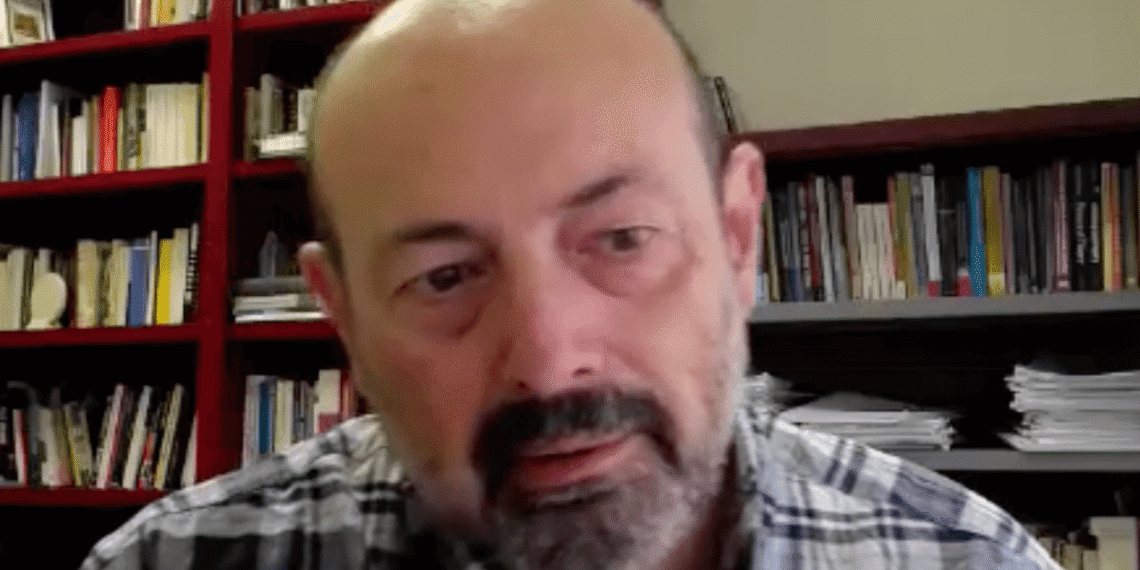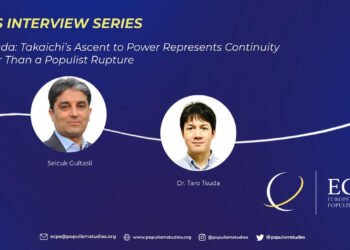In this exclusive interview with the ECPS, Professor Ivan Llamazares of the University of Salamanca analyzes Argentina’s shifting political landscape under President Javier Milei, whose recent midterm victory consolidated his power and emboldened his radical austerity agenda. Professor Llamazares argues that while Milei’s libertarian populism intensifies Argentina’s ideological divisions, it does not fundamentally alter them. “It’s a modification, an intensification—but the underlying structure is still there,” he explains. Rejecting comparisons to Bolsonaro’s authoritarianism, he insists that “authoritarianism is very weak in Argentina, whose popular culture is deeply democratic.” For Professor Llamazares, Milei’s experiment embodies an “extreme illustration” of global right-wing populism—yet remains distinctly Argentine, rooted in enduring social cleavages, economic crises, and democratic resilience.
Interview by Selcuk Gultasli
Argentina’s President Javier Milei has consolidated his grip on power after his party, La Libertad Avanza, won nearly 41% of the vote in the midterm elections, securing 13 of 24 Senate seats and 64 of 127 lower-house seats. The landslide victory marks a major political endorsement of Milei’s radical austerity program, dubbed “chainsaw politics,” defined by deep spending cuts, deregulation, and free-market reforms. The results will allow him to advance his agenda more easily after facing frequent legislative resistance in his first two years in office. Supporters have hailed the win as a rejection of decades of Peronist economic management, while critics warn of deepening poverty, unemployment, and inequality as a result of sweeping cuts to education, healthcare, pensions, and social programs. Despite stabilizing inflation and restoring investor confidence, Milei’s reforms have sparked widespread hardship and a risk of recession. Meanwhile, a record-low turnout of 67.9% reflects rising public apathy and disillusionment with Argentina’s political class.
Against this backdrop of economic turbulence and populist consolidation, Professor Ivan Llamazares, a leading scholar of political science at the University of Salamanca, reflects on the deeper ideological and institutional dynamics shaping Argentina’s political transformation in an exclusive interview with the European Center for Populism Studies (ECPS). Known for his research on ideological structuring and party system dynamics in Latin America, Professor Llamazares situates Milei’s rise within Argentina’s longstanding ideological fault lines—the enduring struggle between Peronist interventionism and neoliberal technocracy.
Professor Llamazares cautions against viewing Milei’s ascent as a structural rupture. “It’s a modification, an intensification,” he explains, “but the underlying structure is still there.” In his view, Mauricio Macri’s victory in 2015 marked a more significant political realignment, introducing a coherent center-right, pro-business coalition that shifted the ideological balance of Argentine politics. Milei, he argues, has merely intensified this trajectory, infusing it with “a new rhetoric, a new style,” and a libertarian flair.
While comparisons to Bolsonaro and Fujimori are unavoidable, Professor Llamazares stresses the limits of authoritarianism in Argentina. “Authoritarianism is very weak… even the authoritarian project itself must be very weak,”he observes. This weakness, he suggests, is rooted in Argentina’s deeply democratic popular culture, shaped by the trauma of the last dictatorship and the political learning processes that culminated in the country’s 1983 democratic restoration. Unlike Bolsonaro, Milei “hasn’t taken significant steps toward building authoritarian institutions.”
At the same time, Professor Llamazares acknowledges that Milei represents “an extreme illustration” of a global populist trend that merges moral populism, economic deregulation, and cultural grievance. Yet, he underscores that many aspects of Milei’s project are “very typically Argentine,” reflecting specific socio-economic tensions—between export-oriented elites and protectionist sectors, between dollarization and social protection, and between a cosmopolitan upper class and the working poor.
Ultimately, Professor Llamazares interprets Milei’s moment not as a new ideological paradigm, but as a cyclical populist insurgency within Argentina’s enduring political structure. “Milei represents something new in style,” he concludes, but the deeper ideological foundations of Argentine politics remain intact.
Here is the edited transcript of our interview with Professor Ivan Llamazares, slightly revised for clarity and flow.
Milei’s Victory Reflects Fear, Not Consensus
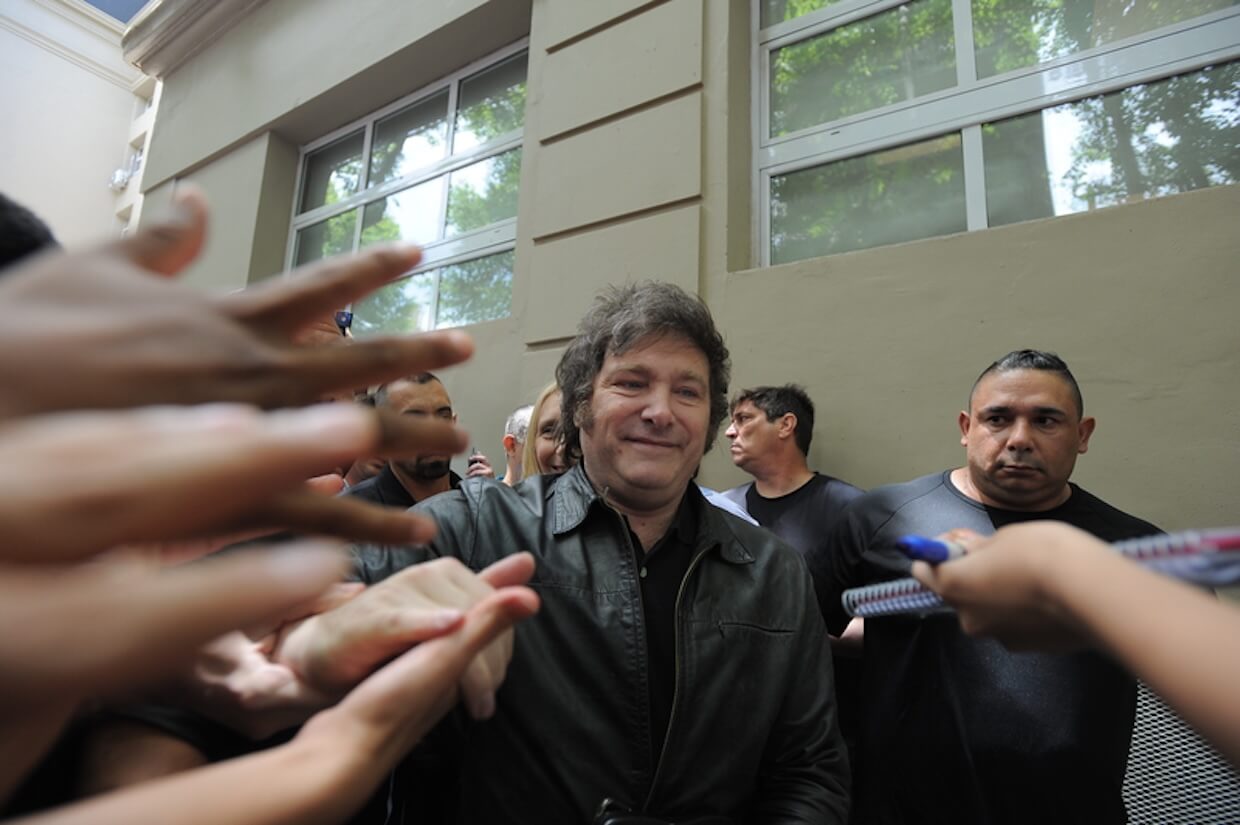
Professor Ivan Llamazares, thank you very much for joining our interview series. Let me start right away with the first question: How would you interpret Javier Milei’s midterm victory in light of Argentina’s ongoing economic downturn, corruption scandals, and record-low voter turnout? What does this outcome reveal about the contemporary resonance and adaptability of right-wing populist discourse within contexts of socioeconomic precarity and institutional distrust?
Professor Ivan Llamazares: It’s a very complex issue; there are many interconnected themes, but one has to interpret this victory in the context of Argentina’s economic and political situation and the dynamics of the last decade. First of all, there is an ongoing and deep division in Argentine society in terms of economic and political projects. On the one hand, we have Peronism and Kirchnerism as a particular and dominant current with internal divisions, and on the other hand, a more market-oriented, right-wing approach that focuses on control, authority policies, favoring market mechanisms, integrating the Argentine economy into the world, less protectionism, and so on. This has been the structural basis of Argentine politics over at least the last decade.
Then there is also the current economic situation. All the problems you mentioned are very acute and very important. In fact, they also led to the defeat of Milei’s party in the Buenos Aires elections a few weeks ago. But, on the other hand, there is also fear—particularly among those sectors that endorse a more liberal economic project. There was fear that the defeat of Milei would entail economic collapse, devaluation, and an uncertain political scenario that could even lead to his removal.
That helps explain the solidification of the coalition in favor of Milei. He received 40% of the vote—40% of the 68% of people who voted—so, in total, it’s probably less than 30% of all eligible voters, about 29% of Argentine society. It’s a majority of votes, but that’s the basic picture. There are, of course, other elements. That doesn’t mean, by the way, that everyone in this coalition is happy about Milei, or likes or trusts him, but they may have preferred the continuation of his project to the uncertainties that would follow his defeat. These, in my view, are the basic elements.
Trump’s Support Boosted Milei’s Momentum, But Interests May Diverge
To what extent might Milei’s electoral resilience be contingent upon exogenous political and financial scaffolding, particularly from Donald Trump and the US Treasury? Could this episode signify the emergence of a transnational populist alliance that fuses neoliberal governance with nationalist rhetoric across hemispheres?
Professor Ivan Llamazares: The answer to the first question is “yes”—it has helped Milei very clearly. It has moved him to the upper bound of the survey projections. It is also clear that the situation of the peso, the chances of devaluation, and so on, improved over the last week due to these commitments by the Trump administration. So it has helped. I don’t know exactly how much, but it must have helped reassure people who perhaps had some doubts yet wanted to avoid the victory of Peronism, and they must have thought ‘at least we have the support of the US, which is the major economic player, and that means the project can continue in this way for a time’. So I think it has been important.
In terms of the alliance, I am not so sure. Of course, there are some ideological, personal, and political affinities—they are close to each other in some respects. But I’m not sure this is going to be so important in the future, in the sense that there are the interests of the US government and the interests of the Argentine government. The Argentine government is dependent, of course, on the US government, not the other way around. But in a situation where US policymakers make a different evaluation in terms of their calculations, they can change. Also, in this case, people refer to ideological proximity, but there are also some economic interests that may have played a role in this support. People close to the Trump political coalition, to the Trump government, also had some interests at stake in the devaluation, investments, and so on. So I would expect some connections and affinities, but I wouldn’t overemphasize them. Each government has its own interests, for sure.
The US Rescue Deepens Argentina’s Ideological Polarization
The US-engineered bailout has been widely interpreted as politically instrumental rather than economically rational. How do such interventions reconfigure Argentine imaginaries of sovereignty, dependency, and anti-elitism, which have long underpinned populist mobilizations from Peronism to Milei’s “anarcho-capitalism”?
Professor Ivan Llamazares: This is complex. On the one hand, this basically reinforces the interpretations that both Peronists and anti-Peronists have about the economic world. In the case of people who are pro-market, export-oriented, and anti-protectionist, who want to integrate the Argentine economy into global capitalism, this confirms that it is better to be associated with the major economic powers of the world, with the US market. So, it works well in that respect.
With regard to the ideological core of Kirchnerism and Peronism, in the same way, this shows that the Argentine government—this anti-Kirchnerist, anti-Peronist government—is just a puppet of international capitalism. So it doesn’t defend the Argentine economy or Argentine society, and it puts Argentina in a situation of total dependency. In fact, they could make the point, and it was a strong one, that this government has increased Argentina’s debt and that we will not be able to pay it. This is just short-term reassurance, but in the end, we face huge problems. We are in a mess.
So, in that sense, it reinforces everything. Perhaps, for people who are doubtful, this is somewhat favorable toward the right because, in this case, they have saved us. Perhaps there are some advantages in being close to these people. And that may be a little similar to the Menem situation. Menem changed Peronist policies, adopted a strategy of being very close to the United States, to international markets, privatization, and so on, and for a while, it worked. Menem won the 1995 elections. So, it works well in terms of Argentine narratives. One has to wait until the end to see how this finishes. Let’s see what happens in a year and a half—what will be the situation of the peso, the economy, whether it will be in recession or not.
Milei Won the Election, but Not ‘the People’
Given the severe austerity measures, deep welfare retrenchment, and widening inequality, how do you account for Milei’s capacity to sustain an affective and symbolic identification with “el pueblo” while advancing a project grounded in radical market orthodoxy?
Professor Ivan Llamazares: He has been successful in solidifying his coalition in order to win against the Peronists and other contenders. I don’t think this means he can portray himself as the leader and representative of a unified Argentine people. I don’t think that is possible. I think the anti-elite populist discourse had more credibility in the presidential elections, to some extent. But right now, the situation is clear. He represents a social coalition that is more middle class. If you look at the electoral results by municipality, he has performed much better in districts where income is higher than in those where income is lower, in contrast to Peronism. He has won, but the idea that “I represent the people, and Peronism represents the elite” cannot work very well right now.
Peronism is weak, but it represents many people—poor people, working-class people, those who have informal jobs, and so on. So I don’t think it works very well in terms of political rhetoric. It worked fine to win the election, but the idea of casta or anti-elite discourse doesn’t work so well right now, actually.
A New Rhetoric, not a New Structure

In your earlier work on ideological dimensions and spatial models of Latin American politics, you emphasized the structuring role of ideology in mediating citizen preferences. How does Milei’s “anarcho-capitalist” imaginary, with its libertarian anti-statism and anti-political moralism, reconfigure Argentina’s traditional ideological continuum between Peronist interventionism and neoliberal technocracy?
Professor Ivan Llamazares: What he represents is rooted in the existing structure of ideological and programmatic confrontation. He’s not departing from it; he’s transforming it slightly—rhetorically and in terms of the social coalition. But he draws his strength from this division. In that sense, I don’t think he’s a radical transformer. He hasn’t changed the parameters of these conflicts, which have a long history in Argentina and became particularly solidified under the Kirchner governments—both Néstor Kirchner and Cristina Fernández de Kirchner.
He hasn’t altered that dynamic drastically; rather, he has given it a new flavor, emphasizing the freedom associated with the market. He has managed to appeal to young people outside formal markets—self-employed workers, young males. But he hasn’t changed the ideological structuring of the Argentine party system. That’s my impression. In a way, he has intensified everything.
This could also be seen, in a similar way, in the election that Macri won. But Macri had a more moderate profile and was more of an establishment politician or leader. Milei is disruptive, but this also has to do with the depth of the Argentine crisis and the depth of Argentina’s conflicts.
Not a Break, but an Escalation of Neoliberal Populism
Can Milei’s experiment be analytically classified as a form of “neoliberal populism,” or do its discursive, moral, and performative elements constitute a qualitatively distinct libertarian-populist hybridity that challenges conventional typologies of populist economics?
Professor Ivan Llamazares: He fits under the first label, but with a new level of intensity and new rhetorical devices. Clearly, it’s pro-market, pro–export-oriented, and neoliberal in an extreme way, with rhetoric that is much more radical. I don’t think he departs from that, but he gives it a libertarian flavor and a highly ideological tone. He draws on obscure economic theoreticians from the Austrian school, speaks in a vulgar way, is rude and disrespectful, and does not represent the elites—the cultural elites—in that sense.
However, he remains rooted in the same neoliberal populist approach. In some respects, he’s also close to Bolsonaro. So I don’t think it’s a total break with the past. By the way, this trend began before Milei, as during the Néstor Kirchner period there were already segments of the Argentine right clearly moving in this direction.
Global Resonance, Local Specificity: Milei’s Unique Populism
How does the Milei-Trump ideological affinity, which is a fusion of moral populism, economic deregulation, and cultural grievance, reflect broader transformations in the grammar of global right-wing populism, particularly its capacity to reconcile anti-establishment rhetoric with financial globalization?
Professor Ivan Llamazares: He represents this trend in a way; he’s an extreme illustration of it—very powerful in rhetorical terms, for instance. Milei embodies something clear and substantive in international terms. I also have the impression that some of these characteristics are very specific to Argentina. I don’t think this ultra-liberal, pro–financial markets, pro–export-oriented, pro-dollarization approach works as well for the radical right in other contexts. I don’t expect or see anything similar when we look at France, Italy, or Germany and when we focus on the radical right.
In some respects, he reflects a distinctly Argentine situation—for instance, the tension between export-oriented and social protection models, the importance of the dollarization process, and the fact that Argentina is an economy where many Argentines hold billions of dollars and have different concerns. There is also the need for the Argentine upper and upper-middle classes to remain strongly connected to international economic markets in different ways—financially and through exports. That’s very Argentinian.
Some elements are similar—pro-market attitudes, certain liberal ideas, anti-elitism, anti-left sentiment, an emphasis on social order, work ethic, discipline, crime and punishment, and punitive policies. But in terms of economic globalization—anti-tax sentiment, by the way, strongly anti-tax—in this respect, many aspects are very typically Argentine.
A Divided Peronism Searching for Renewal
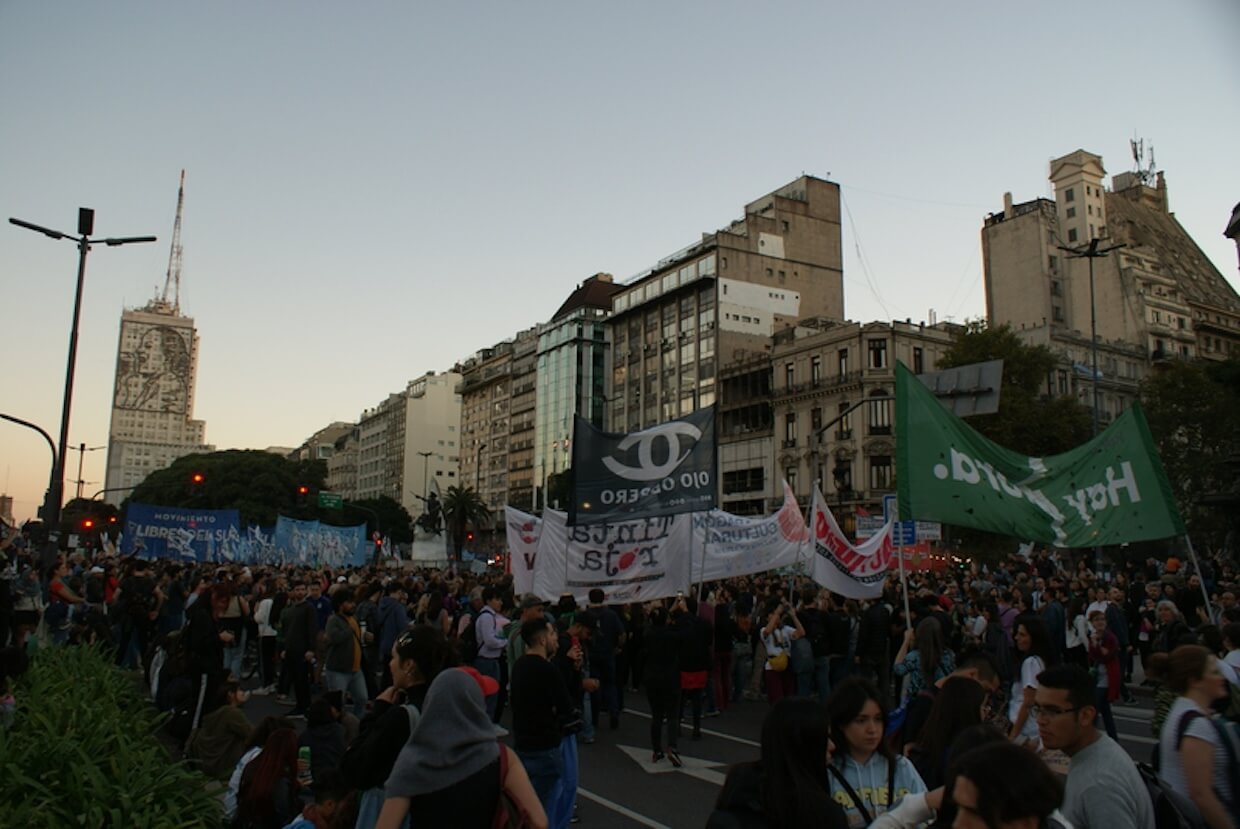
Peronism has historically embodied a polyvalent synthesis of populism, nationalism, and social justice. How is the Peronist opposition reconstructing its ideological and discursive identity in the face of Milei’s anti-Peronist moral crusade and his attempt to redefine “the people” as entrepreneurial individuals rather than collective actors?
Professor Ivan Llamazares: A good question. First of all, one has to say that Peronism is in the process of reconstruction. It is deeply divided, and there is no clear national leadership. On the one hand, we have Cristina Fernández de Kirchner; on the other, other possible leaders, in particular Axel Kicillof, the governor of the province of Buenos Aires. And there might be other figures within Argentine Peronism who could move in different directions because Peronism is a very plastic, very flexible political creature. So, we don’t know exactly how it is going to evolve over the next couple of years. It’s clear that it has to change.
Historically, it has been the dominant force in Argentine politics, and it has now suffered a very humiliating defeat. The analysis of why this has happened is very complex. I would say that they will have to stick to the idea of social justice and reject many elements of the Milei platform. They don’t have alternatives in that respect. Otherwise, they will lose their reason for being, because if they are going to defend entrepreneurship and individual economic freedom, for that purpose people already have Macri, Milei, PRO, Libertad Avanza, and others. That is not possible.
They also have to appeal to trade unionists, organized labor, and new social sectors that are now more Peronist than in the past—or to sectors that are close to some elements of the Peronist platform, such as people who work at universities. So, they cannot change dramatically, but they must find a new balance, for sure. And that doesn’t mean that, when the situation is ripe, they won’t win. They could easily win future elections.
It depends on Milei’s economic performance, but it’s also true that they must find an economic platform to make national policy—and that is very difficult. Alberto Fernández totally failed. He was divided between different currents and tendencies and didn’t find an economic balance. It is possible that someone more pragmatic—let’s think, for instance, of Sergio Massa—someone very pragmatic, who might even be close to the center-right in some respects, could eventually win. This person could maintain some elements of Peronism but move in a more orthodox direction. That is possible.
But one must also keep in mind that Argentine economics and politics are highly volatile. We have many experiences of very drastic changes, and Peronism has the structure and the network to build something new on that basis.
Authoritarianism Is Weak in Argentina’s Political DNA
In comparative perspective, do you discern substantive parallels between Milei’s “chainsaw politics” and other neoliberal-populist experiments in Latin America—such as Fujimori’s authoritarian neoliberalism or Bolsonaro’s reactionary anti-globalism? How do Argentina’s institutional legacies and socio-political cleavages inflect these trajectories?
Professor Ivan Llamazares: There are some shared elements, for instance with Bolsonaro, in terms of rhetoric and economic direction. They clearly share certain themes—also with Fujimori, in his attempts to reshape the Peruvian economic framework and redefine the role of the state. On the other hand, there are important differences.
One of them is that authoritarianism in Argentina—and this is just an intuition, as there is not enough empirical evidence to confirm it definitively—is very weak. I would say so. Even the authoritarian project itself must be very weak. In fact, despite all the excesses, problems, and exaggerations, Milei hasn’t taken significant steps toward building authoritarian institutions.
That may have to do with Argentine popular culture, which is deeply democratic. It may also stem from the intensity of the trauma of the last authoritarian experience—the violence, the suffering, and the learning processes that led Argentine society to bid farewell to authoritarianism in 1983. It could also be related to the characteristics of Argentine civil and political society.
So, I don’t think an authoritarian transformation is taking place right now, and I don’t think it’s very likely. Bolsonaro attempted to do this; he failed. He failed, but at least he tried. I don’t imagine Milei doing the same. I’m not sure if he’s powerful enough, structurally speaking, within the broader right. The argument could be made that some social and economic sectors are using him, but they are not very strongly connected to him. The Argentine right is plural—there are other actors operating there—so I don’t see this happening.
A Cyclical Insurgency, Not a Structural Rupture
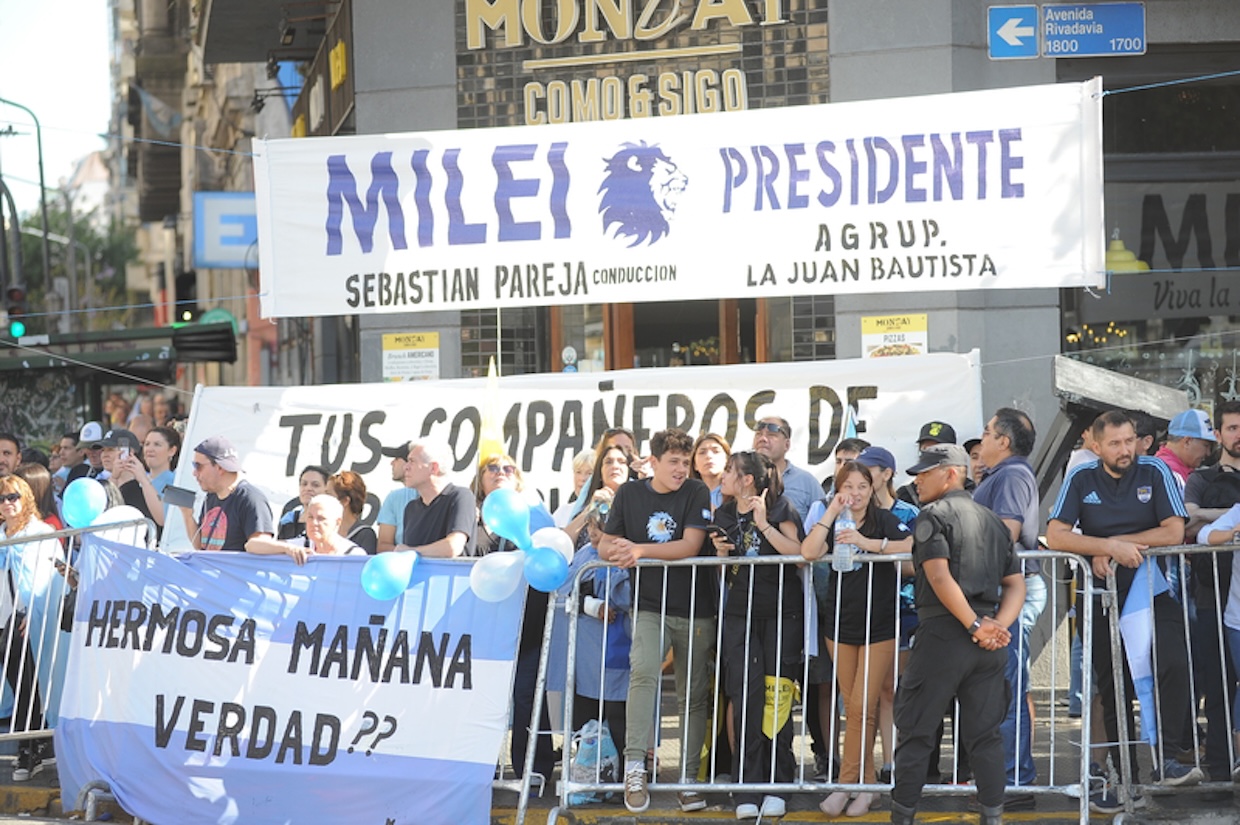
Based on your long-standing research on party system dynamics and ideological structuring in Latin America, does Milei’s ascent represent a critical juncture in Argentina’s cleavage structure—a durable reconfiguration of the left–right and populist–technocratic axes—or rather a cyclical populist insurgency within an enduring Peronist framework?
Professor Ivan Llamazares: I would go for the second interpretation. It’s a modification, an intensification—there are significant changes—but the underlying structure remains the same. In that respect, my impression is that Macri’s victory was more important. Until Macri, you had the Peronists and the Radicals—Alfonsín, a Radical; then the Peronists; then Menem; then De la Rúa, who was a Radical, although he led a broad and plural coalition—and then again, the Peronists. With Macri, you had the emergence of a center-right coalition. It was not Radicalism; it was a new actor, one that was very strongly pro-business, pro-market, and so on.
So, Macri brought about a more important and enduring change, and Milei has intensified this in a way—with a new rhetoric, a new style, representing something different. But the structure of pro-market, pro–export-oriented versus protectionist, social-expenditure-driven, inflationary policies represented by Peronism remains in place. I don’t think that has changed.
Populist Style Loses Credibility Once in Office
How might we interpret the performative and aesthetic dimensions of Milei’s leadership, such as his rock-star persona, symbolic aggression, and social media theatrics, as mechanisms of discursive populist construction, mobilizing affective resonance in a post-institutional political environment?
Professor Ivan Llamazares: They are mechanisms—populist elements, populist styles—and shifts in that direction. I have no doubt about it. These elements are more powerful and usually more effective for politicians who are outside of power. They made much more sense and were more impactful in electoral terms when Milei was an outsider contending for the presidency.
Right now, I doubt that they contribute much to his success. The credibility of these elements tends to erode once a president has been in office for three or four years. So, I don’t think this will add much in the next presidential elections. He represents a different style, but it is not as credible. Now the economic alternatives are clear, and that’s what led to Milei’s triumph—not so much that he gave a concert saying, “I’m the Lion,” and so on. That’s my impression.
And who knows—perhaps in two years we will have a Peronist with a very disruptive style. It’s possible. By the way, in Argentine politics, Peronists are often disruptive in style, while the right and the Radicals tend to be more established figures. Milei has changed that, but Menem was also a disruptor—someone who represented something new in terms of style. Cristina Fernández de Kirchner was as well, in the way she spoke and mobilized. Eva Perón, too, in the past. Peronism has a long tradition in that respect, and it is interesting that Milei has taken it and transformed it in a different way, of course.
Peronism Will Likely Re-Emerge as Argentina’s Next Political Force
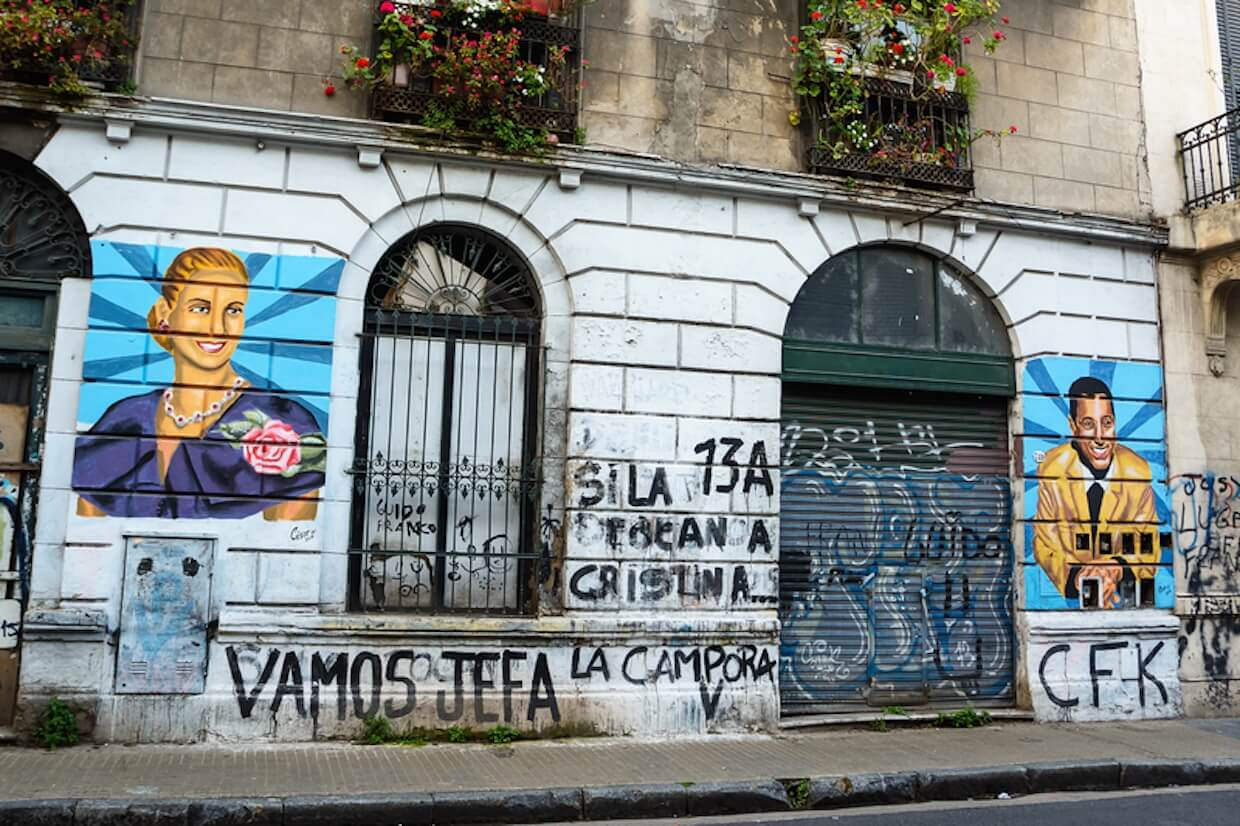
And the final question is: looking forward, do you foresee a durable transformation of Argentina’s political field toward a libertarian-populist realignment, or will economic contradictions, institutional inertia, and popular backlash catalyze the re-emergence of a renewed progressive or Peronist counter-populism capable of reclaiming “the people” from the right?
Professor Ivan Llamazares: A very ambitious question. We cannot predict the future, for sure. Many things can happen. We could also imagine that Milei is successful—it’s a possibility—that the macroeconomy begins to work in a Chilean way in the future. That’s a possibility. We don’t know.
But if I had to make a bet, I would say that this libertarian coalition will also face strong economic problems. I’m saying that not on the basis of any future anticipation, but on the basis of previous experiences. This might be wrong, but recent experiences since the 1970s suggest that it is very difficult for such complex economic and social systems to function smoothly. That’s why Argentine economists say it is very difficult to find a virtuous balance—a virtuous cycle—in Argentine economics, and that sooner or later governments face imbalances and bottlenecks that lead to reconfigurations.
So, I would expect—though I’m not sure if in two years or in four years—a crucial change, an oscillation. And I would assume that Peronism will play a key role in that change, that it will be able to lead a different coalition, and that coalition will have to represent something quite distinct from Milei’s policies. Will they, in the end, pursue the same policies as Cristina Fernández de Kirchner or Néstor Kirchner? Probably not. They would probably have to find a different policy. But I would expect a change in the next two to four years in Argentina’s economic policy.

